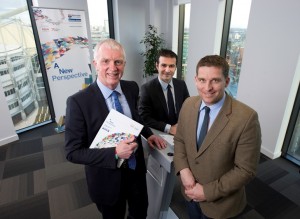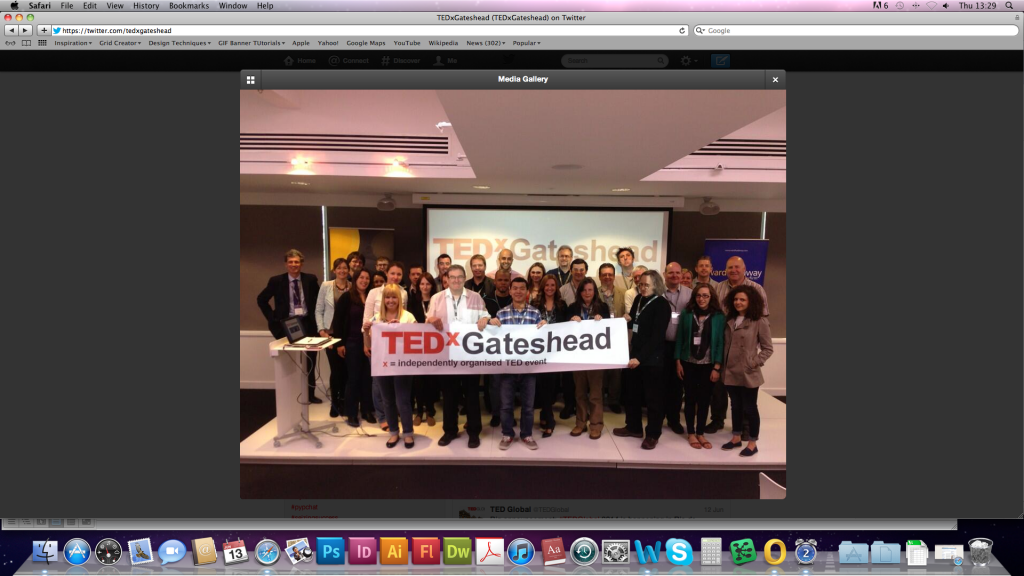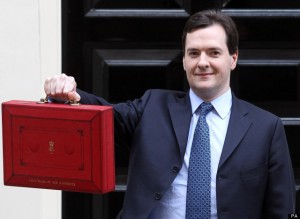
A duo of enterprising talent has been appointed as the Business School confirms its chairs in innovation and enterprise
An innovation guru with unrivalled experience in building the world’s biggest brands, Professor Roy Sandbach is set to be the 10th David Goldman Visiting Professor of Innovation and Enterprise: continuing the tradition of the David Goldman endowment’s highly regarded contribution to enterprise and innovation in the region.
The David Goldman endowment was established at the Business School in 2001 to create a legacy in memory of David Goldman, founder of software company Sage Group Plc. Professor Roy Sandbach is to be welcomed to the Business School as the 2013-14 Goldman Visiting Professor, at his inaugural lecture on 13 March.
It is almost certain that you will use everyday products at home that were conceived and developed by Professor Roy Sandbach. For over 30 years he has led global innovation programmes at Procter and Gamble (P&G), the $80BN multinational and the biggest consumer products company in the world.
Beyond the realms of P&G, Roy brings his skills to bear across the business, science, design and education sectors throughout the UK.
Currently, he leads business engagement for the Centre for Competitive Design at Cranfield University. Roy’s lifelong commitment to science remains strong, he is: a Trustee at Newcastle’s Centre for Life; sits on the Industry Council of the Royal Society of Chemistry; and is a business ambassador for NetPark, the hi-tech science park in County Durham. He is also a non-executive director of NCFE, the national qualifications body, and a governor at Seaton Burn College.
In March he will take the David Goldman Visiting Professor reins from James Timpson OBE, chief executive of the family firm Timpson Group.
Professor Roy Sandbach said:
“I am honoured to accept the David Goldman Visiting Professorship. It offers a wonderful opportunity for me to share broadly my knowledge of strategic business innovation to support enterprise for wealth-creation and social benefit. It is a particular pleasure for me to be able to do this in my home region, among friends and at the university where I gained my Ph.D. Most of all, it will be an honour to build on the legacy of David Goldman.”
The Goldman Endowment funds: a permanent Professorship role within the Business School; the David Goldman Visiting Professor of Innovation and Enterprise; a David Goldman Doctoral Studentship, and the Annual David Goldman Lecture.
The Business School has also announced that its new, permanent David Goldman Professor of Innovation and Enterprise is Savvas Papagiannidis.
As an alumnus of the University, with over 16 consecutive years of studying at the University, Savvas has achieved two PhDs, two Masters, and founded three e-businesses.
Professor Papagiannidis’ research interests lie in the e-business discipline, where he aims to investigate how e-business technologies affect social and business environments, organisational strategies and underpinning business models, and how these are implemented in terms of functional innovations.
Professor Papagiannidis said:
“I am delighted with my new role as the permanent David Goldman Professor of Innovation and Enterprise.
“I hope that in my new position I am able to make an impact by leading the development and delivery of the innovation and enterprise agenda of the Business School, by encouraging sustainable relationships with internal and external stakeholders.
“I am looking forward to welcoming Professor Roy Sandbach to the Business School. As an expert in open innovation, brand building, and networking for competitive advantage, Roy’s high- calibre career is one that makes him very suited to the demands of this visiting professorship.”
David Goldman Visiting Professor 2012-13, James Timpson OBE said:
“This role is all about imparting knowledge and more importantly, inspiring enterprise. However, it isn’t a one-way process: I have also been educated by the students and businesses I have met over the past 12 months. It has been a great experience, and I am delighted to have been given such an esteemed role.
“I wish Roy a very enjoyable and educational year!”
If you would like to book your free ticket to the Goldman Lecture please email: bsevents@ncl.ac.uk
Past David Goldman Visiting Professors of Innovation and Enterprise:
2012- 2013 – James Timpson, OBE, chief executive of Timpson Group
2011-2012 – Tom Maxfield, entrepreneur and former Sales Director for Sage Group
2010-2011 – Will Dracup, founder and chairman of Nonlinear Dynamics
2008 -2010 – Dr Tony Trapp, chairman of IHC Engineering Business.
2007-2008 – Fiona Cruickshank, co-owner and director of SCM Pharma.
2006 -2007 – Paul Callaghan, chairman of Leighton Group.
2005 – 2006 – Chris Thompson, managing director of Express Group.
2004 – 2005 – Mark I’Anson, technology entrepreneur.
2003 – 2004 – Paul Collard, chief executive at Creativity, Culture and Education



